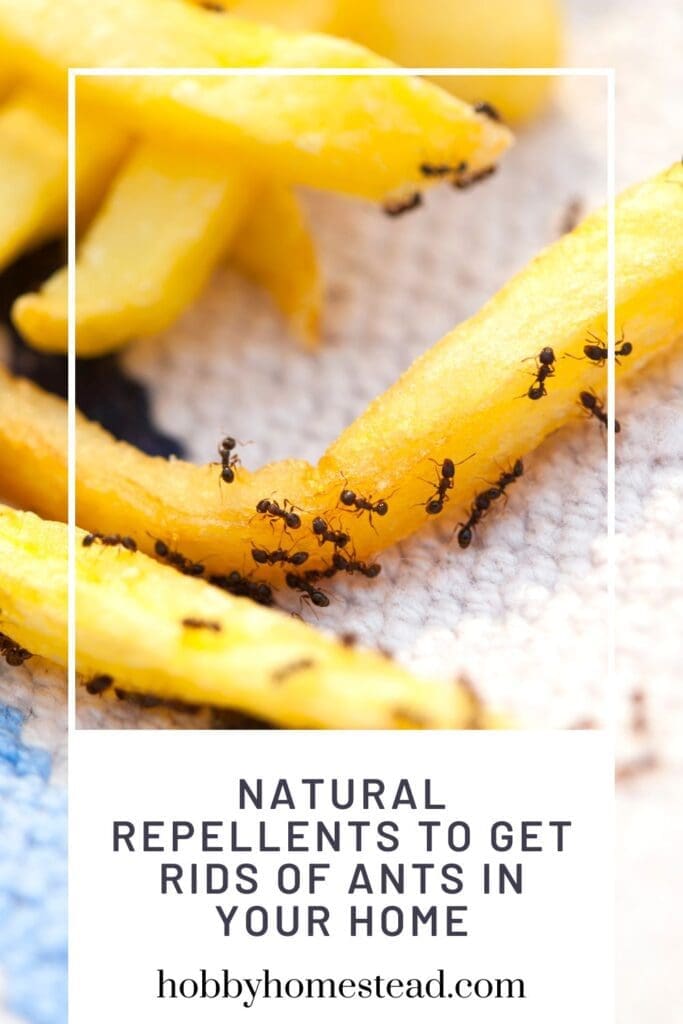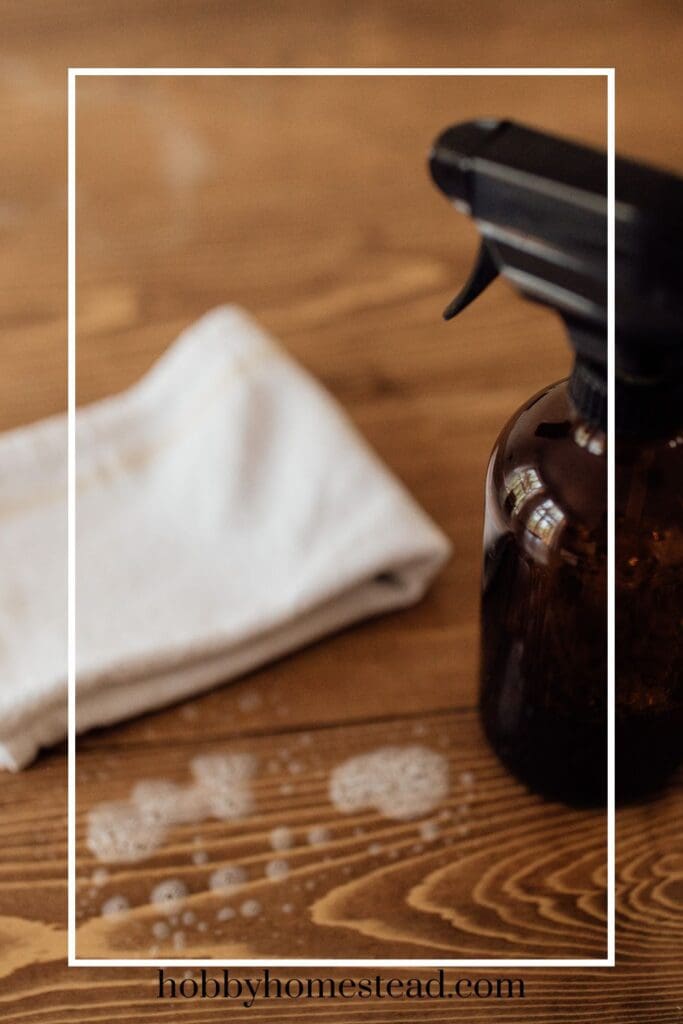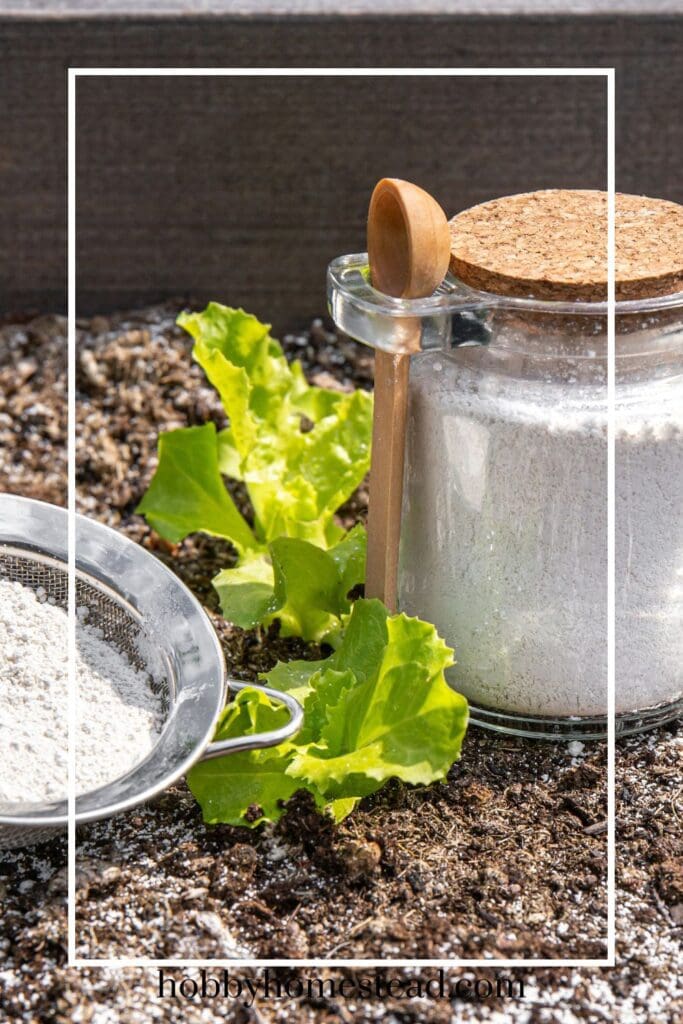Natural Repellents to Get Rids of Ants in Your Home. They are a common household pest that can be both frustrating and difficult to eliminate. Whether you’re dealing with sugar ants, carpenter ants, or odorous house ants, you’re likely searching for effective solutions to keep your home ant-free.
The good news is that there are many natural methods available to deter ants without relying on toxic chemicals. In this article, we’ll explore some of the most effective natural ant repellents, including essential oils, diatomaceous earth, and more, to help you maintain an ant-free home.
My Favorite Way to Repel Ants
Lately, we have been seeing a few different varieties of ants. Not many, just a few here and there. But, when you see one, you know there is more.
We bring in garden produce and that brings in extra dirt and bugs. It’s that time of year when we have all sorts of extra bugs in our environment.
I’ve tried these methods, and my all-time favorite is to just add peppermint oil when cleaning with my soapy water. I have to clean anyway, and this really helps.
The second best solution is to use the cinnamon around windows and doors.

Table of contents
- My Favorite Way to Repel Ants
- 16 Natural Repellents to Get Rids of Ants in Your Home
- White Vinegar Solution or Apple Cider Vinegar
- Citrus Peels and Lemon Juice
- Cinnamon
- Peppermint Oil and Essential Oils
- Diatomaceous Earth (DE)
- Boric Acid and Sugar Ant Bait
- Cucumber Peels
- Coffee Grounds
- Salt or Baby Powder
- Herbs and Spices
- Baking Soda and Sugar Ant Bait
- Cayenne Pepper and Black Pepper
- Lavender Oil
- Chalk
- Mint (Peppermint or Spearmint)
- Soap or Cleaner Spray
- How to Prevent Ants from Visiting Your House in the Future
16 Natural Repellents to Get Rids of Ants in Your Home
White Vinegar Solution or Apple Cider Vinegar
One of the best ways to deter pesky ants is with a simple vinegar solution. Ants rely on scent trails to find food sources and communicate with their colony. The strong smell of vinegar disrupts these scent trails, making it an effective solution for ant control.
Mix equal parts white vinegar and water in a spray bottle and apply it to windowsills, door frames, and other potential entry points. This vinegar solution is a great way to keep ants at bay without introducing harmful chemicals into your home.
Caution. Because of its acidity, vinegar can be too harsh for natural stone countertops. If you have granite, marble, quartz, or other types of stone surfaces, it’s better to use your usual spray cleaner to wipe them down. This will still help deter ants by removing their scent trails.
Citrus Peels and Lemon Juice
Ants tend to avoid anything with a citrus smell, making citrus peels and part lemon juice effective natural repellents. The acidic properties disrupt their trails, and the strong scent keeps them from returning.
Place citrus peels along windowsills and in cupboards. You can also create an ant-repellent spray by mixing part lemon juice with water in a spray bottle and applying it around entry points and kitchen counters.
Cinnamon
Cinnamon’s strong, pleasant aroma can deter ants from entering your home. The smell is too overpowering for them to navigate, and it disrupts their communication with other ants.
Just sprinkle ground cinnamon around ant entry points or make a spray by mixing a few drops of cinnamon essential oil with water. This method not only repels ants but also leaves your home smelling great.

Peppermint Oil and Essential Oils
Peppermint oil is a potent ant repellent that many species of ants find intolerable. The strong scent of peppermint overwhelms their sense of smell and masks their scent trails, making it harder for them to navigate. Other essential oils, like tea tree oil and oil of lemon eucalyptus, are also effective natural insect repellents.
Add several drops of peppermint or tea tree oil to a spray bottle with water and apply it to ant-prone areas, such as kitchen counters and around leaky pipes. You can also soak a cotton ball in peppermint oil and place it near entry points or in ant traps.
Make a spray using peppermint oil, tea tree oil, and citrus oil. You can make a spray using 8 ounces of water and 30 to 40 drops of essential oil, and 30 drops of alcohol.
Diatomaceous Earth (DE)
Diatomaceous earth is a fine powder that works as a natural ant killer. This non-toxic substance damages the ants’ digestive systems, leading to dehydration and eventually killing them. It’s particularly useful for controlling carpenter ants and other species of ants that are difficult to eliminate.
Sprinkle food-grade diatomaceous earth along ant trails, around door frames, and near any potential entry points. For best results, reapply after rain or cleaning.
Boric Acid and Sugar Ant Bait
A mixture of borax and boric acid is a natural way to eliminate ants by targeting the entire colony. The sugar attracts the ants, and the boric acid works as a slow-acting poison that the ants carry back to the colony, eventually killing the queen and other ants.
Mix boric acid with powdered sugar or corn syrup to create an effective DIY ant killer. Place small amounts of the mixture in areas where ants are frequently seen.
Caution. Be cautious when using boric acid around children and pets.
Cucumber Peels
Surprisingly, ants have a natural aversion to cucumbers, especially the bitter varieties. Cucumber peels can be a great, natural barrier to keep ants out of specific areas.
Place fresh cucumber peels around entry points like windowsills or along the kitchen counter. Replace the peels every few days. Otherwise it will attract fruit flies and not be as effective.
Coffee Grounds
Used coffee grounds are another natural deterrent for ants. Their strong scent masks the ants’ trails and creates a natural barrier that ants are reluctant to cross.
Spread used coffee grounds around windowsills, door frames, and areas where ants enter your home.
Bonus. You can also place them in your garden to deter ants and other pests.
Salt or Baby Powder
Both salt and baby powder create barriers that ants have difficulty crossing. Ants will avoid these substances as they find it hard to navigate over them.
Sprinkle salt or baby powder along doorways, windowsills, and other entry points. This creates a natural barrier that prevents ants from entering.

Herbs and Spices
Many herbs and spices are natural ant deterrents, including bay leaves, cloves, and garlic. These can be placed strategically to discourage ants from invading your home.
How to Use. Place whole bay leaves or garlic cloves in cabinets, drawers, or pantries. You can also sprinkle cloves in areas where ants have been spotted.
Baking Soda and Sugar Ant Bait
If you’re dealing with sugar ants, a combination of baking soda and powdered sugar can help you eliminate them. Baking soda disturbs their internal systems, acting as a natural ant killer.
Mix equal parts baking soda and powdered sugar and place it in areas where ants are commonly seen. This DIY ant bait can help tackle even large ant colonies.
Cayenne Pepper and Black Pepper
Both cayenne pepper and black pepper are effective options for creating a natural barrier that ants won’t cross. The strong scent of these spices disrupts their navigation, making them ideal for DIY ant control.
Sprinkle either cayenne or black pepper around ant-prone areas, like along baseboards or entry points. For an extra punch, combine with other natural remedies like cinnamon or bay leaves.
Lavender Oil
Lavender oil has a strong scent that can mask ant scent trails and repel them, making it a good natural insect repellent.
While it may not be as potent as peppermint oil in repelling ants, it can still be useful in combination with other essential oils.
Add lavender oil to water in a spray bottle and apply it to ant-prone areas like doorways, window sills, and kitchen counters. You can also use it on a cotton ball and place it near entry points.
Chalk
Chalk is thought to work by disrupting the ants’ scent trails, which they use to communicate and navigate toward food sources. While it’s not a permanent solution, drawing chalk lines around areas where ants are entering your home (like door frames, windowsills, or cracks) can create a temporary natural barrier that ants are reluctant to cross.
Draw a thick line of chalk across any ant trails or potential entry points. Reapply as needed since chalk can wear off over time or with cleaning.
Mint (Peppermint or Spearmint)
Mint, especially peppermint, is a well-known natural ant repellent. The strong scent of mint disrupts ants’ ability to follow their scent trails and drives them away. Peppermint oil is one of the most commonly used essential oils for repelling ants, but fresh mint leaves or dried mint can also work.
Mint plants or leaves. Planting mint around your home’s exterior or placing dried mint in cupboards, window sills, or near doors can also help deter ants naturally.
Soap or Cleaner Spray
Soap or a regular cleaner spray can also be effective at removing ants’ scent trails without damaging your countertops, including natural stone surfaces.
I like this method because this gets rid of your ant problem, and it also cleans your house. Soap and glass cleaners contain chemicals that kill ants on contact.
A simple solution of soap and water can break down the chemical trail that ants follow, disrupting their navigation.
For example, dish soap mixed with water in a spray bottle is a safe and effective option for wiping down surfaces. Similarly, using your usual non-abrasive cleaner spray will clean the area and eliminate the scent trails that guide ants.
Spray on the entrances of your house and areas where ants have been spotted.
How to Prevent Ants from Visiting Your House in the Future
While these natural repellents can help get rid of ants. But, how do you keep them from showing up in the first place?
Clean up food messes. Keeping your home clean really helps keep them away. Ants are attracted to food, so keeping counters, floors, and food storage areas clean and free of crumbs is crucial. Take care of those small crumbs too. If they don’t have any food, they will move on.
Put the Dog Food and Cat Food Away.
Yes, just like people food, Ants love pet food too. When your furry friend is done eating put it away. Regularly clean their eating area.
Store Food Properly. Use airtight containers to store pantry items like sugar, cereal, and flour. If you keep it in the bags it comes in, the critters and ants have a better chance of getting to it.
Take Care of Things Outside
Seal Entry Points. Inspect your home for cracks, gaps, and other entry points where ants can get in. Seal these areas to prevent them from re-entering.
Take Out the Trash Regularly. Ants are often attracted to trash, so make sure to take it out frequently and clean the area around the trash can.
Keep Plants Trimmed. Check to see if any plants are up against the house. Ideally, they should be at least 18 inches away from the foundation.
Reduce Moisture
Some ants like carpenter ants, and moisture ants look for moisture-damaged wood to nest in. Repair any leaks and water damage
Take Care of Infected Houseplants
Sweet smells attract ants and it’s possible that your indoor plants can cause an infestation of ants. Keep your plants healthy. According to The Spruce, if you begin to notice a swarm of ants around your potted plants, spraying your botanicals with a garlic spray will remove the problem and keep your plants healthy.
What is none of these work for you?
Unfortunately, sometimes, these natural ant repellents only send them in another direction.
You can resort to pesticides from the store or consider calling an exterminator.
What scents do ants hate?
They don’t like the smell of peppermint, citrus, black pepper, cayenne pepper, cedar, or lavender.
By using natural repellents and maintaining a clean home, you can effectively keep ants at bay without relying on harsh chemicals. These eco-friendly solutions are safe for your family, pets, and the environment. The next time you spot ants, try one of these natural remedies to reclaim your space.
References
Better Homes and Gardens. How to Get Rid of Ants in Your Home.
The Spruce. 20 Natural Repellents to Get Rid of Ants.


